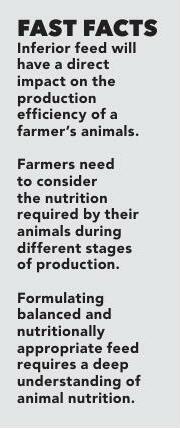Versuchen GOLD - Frei
What to consider when mixing your own feed
Farmer's Weekly
|September 01, 2023
Mixing your own feed can save you money in the short term, but can also cost you in the long term if you do not pay attention to sourcing the optimal ingredients.

Livestock farmers have had a tough time over the past few years due to the high price of commodities, such as maize. These have led to an increase in the price of feed. For most livestock operations, feed constitutes the largest percentage of all input costs, and an increase in the price of feed inevitably leads to a drop in a farmer’s profit margin. When a farmer buys animal feed, he or she is not only paying for the commodities used in the feed, but also for the cost of processing. As such, many farmers have turned to mixing their own on-farm rations to help lower their feeding costs.
While it may seem like a good way to manage input costs more effectively, farmers should be cautious when deciding on this approach. Mixing feed is not simply a matter of putting a few ingredients together, particularly as livestock operations exist to make a profit. Inferior feed will have a direct impact on the production efficiency of a farmer’s animals, and while a farmer may thus be saving money in the short term, mixing his or her own feed could end up costing him or her over the long term.

Formulating balanced and nutritionally appropriate feed requires a deep understanding of animal nutrition, as well as access to accurate nutritional information for various feed ingredients. Without proper knowledge and resources, it’s challenging to ensure that the feed meets the animals’ specific needs. It is also important to remember that animals’ feed requirements change depending on the stage of production they are in, and so it is also important for the farmer to fully understand what is required for each stage of production.
Diese Geschichte stammt aus der September 01, 2023-Ausgabe von Farmer's Weekly.
Abonnieren Sie Magzter GOLD, um auf Tausende kuratierter Premium-Geschichten und über 9.000 Zeitschriften und Zeitungen zuzugreifen.
Sie sind bereits Abonnent? Anmelden
WEITERE GESCHICHTEN VON Farmer's Weekly

Farmer's Weekly
Tropical avo smoothie
Escape to the tropics with this luxurious, creamy, and vibrant smoothie! Blending rich avocado and sweet mango with zesty lime, fragrant mint, and a punch of tangy granadilla, this recipe transforms into a nutrient-packed and silky-smooth treat.
1 min
January 16-23, 2026
Farmer's Weekly
THE HITCHING POST
I am a 60-year-old white woman who loves camping, animals, the outdoors and watching sport.
2 mins
January 16-23, 2026

Farmer's Weekly
The enduring legacy of Tiyo Soga
In the 1850s, Tiyo Soga, a Xhosa man, became the first ordained black South African minister. But as Mike Burgess writes, his legacy would also be determined by his all-round intellectual abilities honed by a solid Scottish education.
4 mins
January 16-23, 2026

Farmer's Weekly
Isuzu D-Max shows single cabs can be comfortable companions
Bakkie manufacturers don't give single cabs to the media due to them generally being regarded as workhorses without the bells and whistles from fancier double cabs. The Citizen's Charl Bosch was gobsmacked when a single cab arrived for a three-month stay.
2 mins
January 16-23, 2026

Farmer's Weekly
South Africa eyes home-grown rice as ARC expands research efforts
South Africa is taking bold steps toward reducing its dependence on rice imports by exploring the viability of home-grown upland rice. Through a major research drive led by the Agricultural Research Council's Small Grain division, scientists and industry partners are testing rice varieties capable of thriving in South Africa's diverse soils and increasingly water-scarce climate. Anelisa Gusha reports.
3 mins
January 16-23, 2026

Farmer's Weekly
Spanish tortilla
Bring the authentic flavours of Spain to your table with this robust and satisfying Spanish tortilla.
1 min
January 16-23, 2026

Farmer's Weekly
New year brings marvellous new titles
Patricia McCracken, like many of us, has settled back into the grind of the new year and picked up a diverse selection of books ranging from travel, to fiction, to non-fiction and a delightful local children's adventure.
2 mins
January 16-23, 2026
Farmer's Weekly
Nitrogen 'switch' unlocks greener crops
A ground-breaking discovery by molecular biology professors Kasper Røjkjær Andersen and Simona Radutoiu at Aarhus University in Denmark offers a significant step toward developing self-fertilising grain crops, potentially revolutionising agriculture to be greener and more climate-friendly.
1 min
January 16-23, 2026

Farmer's Weekly
Sweet prospects: the current state of litchi production in South Africa
Bram Snijder, agricultural consultant and chairperson of the South African Litchi Growers' Association, spoke to Octavia Avesca Spandiel about the litchi industry embracing new opportunities, tackling challenges, implementing innovation, and reaching markets both locally and internationally.
6 mins
January 16-23, 2026

Farmer's Weekly
How AFGRI uses technology to unlock farm finance from asset to market
As modern farming becomes more capital-intensive and digitally driven, AFGRI is reinventing agricultural finance by linking technology directly to lending decisions.
5 mins
January 16-23, 2026
Translate
Change font size
